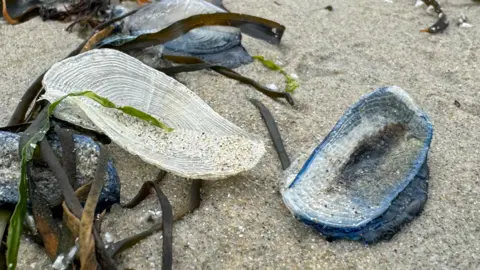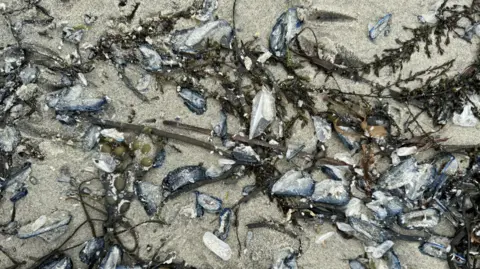By-the-wind-sailors wash up on Guernsey beaches
 BBC
BBCA colony of creatures closely related to the Portuguese man o' war has washed up on beaches around Guernsey.
Commonly referred to as by-the-wind-sailors, Velella velella are not jellyfish but defined as free-floating hydrozoan.
The nickname comes from the small stiff sail which they use to catch the wind and propel them along an ocean's surface.
Experts said when the creatures were alive the sting was "very mild".
'Gorgeous little sail'
Liz Sweet, a marine biologist, said the "mass stranding events" were likely caused by strong winds.
She said: "The closest related animal [to the Velella velella] we get here is the Portuguese man o' war.
"So they are related to jellyfish, but different.
"They are not the stinging things we think when we talk about jellyfish. They can sting, but it is a very mild sting."
Speaking to BBC Radio Guernsey, Ms Sweet said usually the creatures would not turn up so late in the year.
She said: "Anywhere with strong onshore winds can experience mass-stranding events like this.

"We have seen them wash up before, but usually earlier in the year or in the autumn storms."
By-the-wind-sailors are often recognised for one part of their body.
She added: "Unlike jellyfish, who can actively swim or change direction depending on the current, these guys travel on the sea surface with a gorgeous little sail.
"When it's alive, it'll have tentacles hanging down and they will drift with the wind."
She encouraged people to have a look if they saw some on beaches, but also urged caution.
"Although it's a mild sting, you don't know if you're allergic.
"So, my advice is to look but don't touch, and keep your dogs away from eating them."
Follow BBC Guernsey on X (formerly Twitter) and Facebook. Send your story ideas to [email protected].
